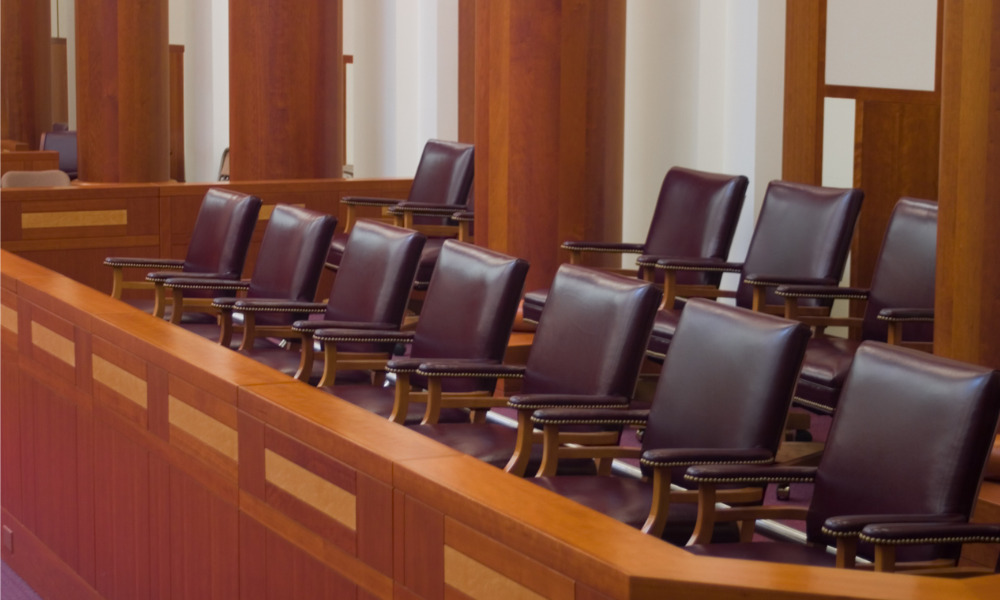
Jury strike only option to battle court delay during pandemic

Sponsored article
During the COVID-19 pandemic, personal injury lawyers have a tool at their disposal to combat now even lengthier court delays — striking the jury — but the use of this workaround is anything but straightforward.
“You can bring a motion, and because judge-alone trials are going ahead virtually instead of adjourning the matter for a year it can proceed,” says Will Harding, lawyer at McLeish Orlando LLP. “Many people are doing that right now — it’s the one option right now to try and get some justice and not have things delayed further — but it gets complicated. There are a number of different factors that make it difficult to predict how things are going to go.”
With this specific issue, Harding notes it’s very regional even within Ontario. If an area is anticipating getting back to jury trials soon, that’s going to support not striking the jury. If it doesn’t look like the region will have the facilities or resources anytime soon, or perhaps the case in question has already been adjourned a few times, that’s going to favour allowing the strike.
“That's the authority from the Court of Appeal — it’s very case specific and region specific, so depending on where your case is it’s going to really have an impact on your likelihood of success in striking the jury,” Harding says. “This can prevent resolution for people depending on the jurisdiction they’re in.”
Even before the pandemic, some advocated for eliminating jury trials in personal injury cases not least of all because a judge alone can get through things much faster than juries. It provided a way to work on that series delay, and was already “a highly debated subject on its own,” Harding notes. Despite offering “a partial solution to the issue of delays, we do find insurance companies are generally reluctant and do oppose those motions to strike the jury.” They want juries on the trials and as the law stands, they’re entitled to that unless it’s in the interest of justice to strike it, he notes.
This ultimately plays into a larger access to justice issue due to the pandemic. Even in a pre-COVID world the courts — while doing the best with what they had — were already booking trials for two years out, depending on the jurisdiction. Now in the midst of the pandemic, Harding says the increased backlog has made things that much more complicated. He’s already had to adjourn a few trials “because they’re jury trials and we’re just not able to do that in a COVID environment.” Though he respects the fact it’s a tough issue for courts to contend with, he says this delay gives rise to access to justice issues.
“This is now hanging over my clients heads for another year or so, it creates procedural issues with respect to witnesses and making sure all of the reports are up to date and then of course if there are any liability issues it’s just another year for memories to fade.”
This is a common issue for plaintiff personal injury lawyers, because their goal is to get a fair resolution for clients — ideally sooner rather than later so they can get on with their lives — and on top of the fact some cases actually need a trial and you can’t get one for years, in most other cases you often need that “last stop in the litigation process” on the books for the insurance company to make the final offer that's going to get the case settled. If plaintiff lawyers are constantly having dates pushed or can’t even get a date, Harding finds it’s more difficult to settle files at an earlier stage and at a reasonable number.
“A lot of the time it’s not actually going to go through the whole trial, but having that threat that a trial is upcoming is often what gets the parties to really put their heads to the matter and work and get to a resolution,” he says. “If you don’t have that hanging over everybody’s heads — that’s how these things can just drag on and on and on."
Harding says that it is critical for plaintiff personal injury lawyers to be up to date on the status of the current case law, as it is constantly evolving. This knowledge will allow counsel to properly gauge when a motion to strike the jury is likely to be successful or not. If the case contains favourable factors for striking the jury as outlined by the Superior Court and Court of Appeal, then lawyers need to be aggressive in bringing their motion and trying to get their clients cases heard